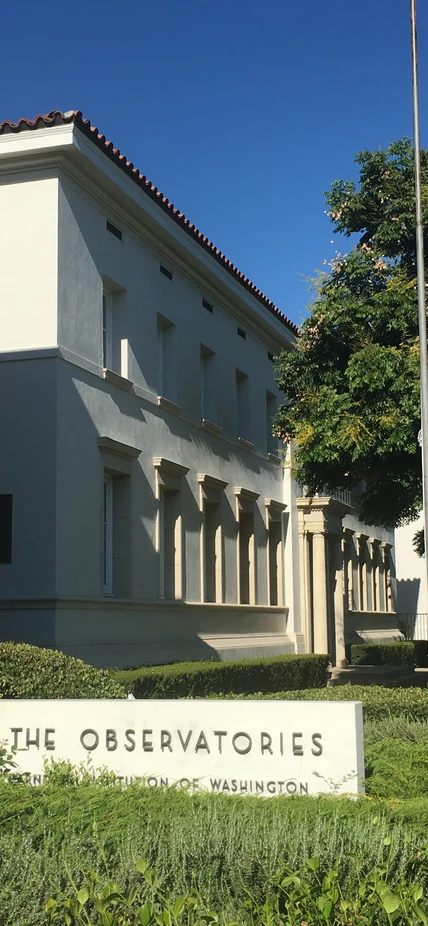During this global crisis, Carnegie Observatories astronomers are stepping up and finding different ways to lend their expertise to various volunteer and charitable efforts helping frontline healthcare workers, area schools, and other members of the community.
Experts from our instrumentation team and our machine shop are working together to 3D print personal protective equipment for local medical facilities. In March, Instrumentation Postdoctoral Fellow Rosalie McGurk located a 3D printer design for the headband brims of protective face shields on the Markforged website and acquired the necessary supplies for printing and assembling the shields in their entirety, including elastic, foam tape, and clear plastic. Shop Foreman Vince Kowal modified this design to strengthen the strap holders and developed a system for using a hot water bath to form the plastic sheeting that comprises the actual shield component into a curved shape. Once the assembly protocol was finalized, production began in earnest.
OPTO Mechanical Engineer Charlie Hull, who lives close to our campus, has been keeping the 3D printer running almost continuously. When all of the pieces are synthesized, Kowal cleans and assembles the masks, and prepares them for distribution. McGurk delivers the completed shields to Mt. Wilson STEM Program Coordinator Jessica Rodriguez, who delivers them to Infectious disease specialist Dr. Elizabeth Maslow-Najera of Adventist Health Glendale. As of early May, 50 face shields have been completed on the Observatories’ campus. The team has material to synthesize another 25 shields, and intends to keep them coming for as long as there is a need and supplies can be obtained.
McGurk is also working with the husband of Hubble Postdoctoral Fellow K. Decker French, Mike DeYoung, to create additional face shields. DeYoung has been using his personal 3D printer to make headbands and McGurk is assembling the component pieces into finished face shields. McGurk and DeYoung have created an additional 24 face shields for Dr. Maslow-Najera.
Before Carnegie and Mt. Wilson donated the shields, Dr. Maslow-Najera was making do with only safety glasses and donated N95 masks. When used in conjunction with surgical masks, these shields provide CDC-recommended levels of protection for healthcare workers interacting with a COVID-19 carrier.

But the face shield work is far from the only community minded undertaking to which members of our staff are contributing. Observatories Staff Scientist Juna Kollmeier is developing a program she’s calling “Zoom Past the Moon,” which would connect astronomers to elementary school classes where they can teach short school lessons on a variety of astronomy topics. This project is currently in its early stages as Kollmeier works to identify schools that may be interested in supplemental educational programs for students.

Carnegie-Princeton Fellow Louis Abramson is lending a hand in his capacity as a member of the Central Hollywood Neighborhood Council. In April, Abramson worked with another councilmember, Ferris Wehbe, to contact about 4,000 seniors among their constituents and determine whether anyone might need additional help during quarantine. Abramson and Wehbe have since worked with a volunteer staff and many local organizations, including the L.A. Cedars Rotary Club, the Los Angeles Regional Food Bank, The Los Angeles Conservation Corps, the Los Angeles Police Department, and the Hollywood Schoolhouse to make almost 1,600 deliveries of approximately 24,000 total pounds of food to constituents’ homes. Their efforts included outreach to Spanish, Russian, Armenia, and Korean speakers, thanks to the help of their volunteer team. You may have even seen their work featured in The Los Angeles Times!

Outreach Coordinator Jeff Rich is volunteering with the Pasadena Educational Foundation to distribute meals for Pasadena Unified School District (PUSD) students. Since PUSD students are remote learning for the remainder of the academic year, the PUSD Food & Nutrition Services (FNS) program is providing meals for students 18 and under. Families are able to drive through and pick up meals for their children at a number of school sites. Additional information about the program and how local residents can volunteer can be found here.

"I'm so proud that members of our staff at all levels have donated their time and energy to serving our communities during this crisis," said Observatories Director John Mulchaey. "Our campus has a longstanding commitment to outreach and I'm glad we're finding ways to maintain this tradition during the COVID-19 pandemic."
These impressive efforts by Observatories’ staff members are part of a broader institution-wide initiative to use our Carnegie resources to help in the response to COVID-19. You can read about the contributions of our colleagues at Carnegie’s Earth and Planets Laboratory here.
Individuals who would like to contribute toward the cost of face shield materials and educational institutions interested in participating in the Zoom Past the Moon program are encouraged to email OBShelps@carnegiescience.edu.
